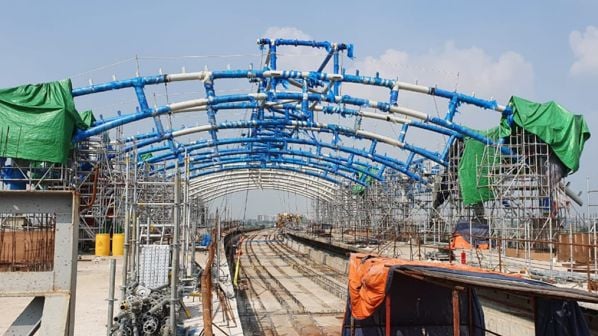THE government of Bangladesh has unveiled a proposal to construct a second 258km underground metro network in Dhaka over the next 50 years to ease congestion in the capital.
The draft feasibility study for the network, developed by the Bangladesh Bridge Authority (BBA), includes a total of 11 routes in the city and its outskirts, The Daily Star reports.
The 50-year plan will be implemented in three phases, with four lines covering a total of 102km due to be built in the first phase, and another 85km and 71km of lines due to be built in the second and third phases respectively.
The feasibility study was launched by BBA in 2018, and carried out by a consortium led by Typsa, Spain. The group initially investigated the feasibility and preliminary design of a 90km network, before the feasibility study was expanded to 238km.
In the draft feasibility study submitted on March 15, the consortium proposed building a 258km network consisting of 11 routes.
This would be in addition to the 128.74km, six-line Metro Rapid Transit (MRT) network currently under construction in Dhaka, which includes both elevated and underground sections. The project is due to be completed by 2030.
Under the draft feasibility study, the second metro network’s lines would be built 30m below the surface, and would use Tunnel Boring Machines (TBM) for the tunnels and the cut and cover method for the stations.
The first route, Line O, would run 29.35km north-south from Tongi to the Jhilmil Project area in Keraniganj, at a cost of around $US 8bn. The three other routes included in phase 1 include a 20.18km line from Gabtoli to Belabo; a 19.31km line from Keraniganj to Sonapur; and a 34.98km line from Jahangirnagar Uttara Sector-13 to Narayanganj via Bashundhara South and Fatulla station.
While it has long been suggested, the construction of the underground network was not included in the revised strategic transport plan for Dhaka, which was approved in 2015. The network would cost more than the under-construction MRT projects, according to the feasibility study.
The minister for road transport and bridges, Mr Obaidul Quader, says the network would be used by half of the city’s 8 million working residents once completed, easing congestion across the city.
BBA executive director, Mr Belayet Hossain, says the study is 65% complete, with the final report due to be made available by October. Hossain says a number of organisations have expressed interest in investing in the project.
However, additional project director (civil) of MRT Line-6, Mr Abdul Baquee Miah, told an event to launch the draft feasibility study that many of the proposed lines would run in parallel with the MRT lines. He added that the report does not cover how the land to construct the tunnels and stations would be found in the crowded city, or how the projects would be financially viable.
For detailed data on metro projects around the world, subscribe to IRJ Pro.

